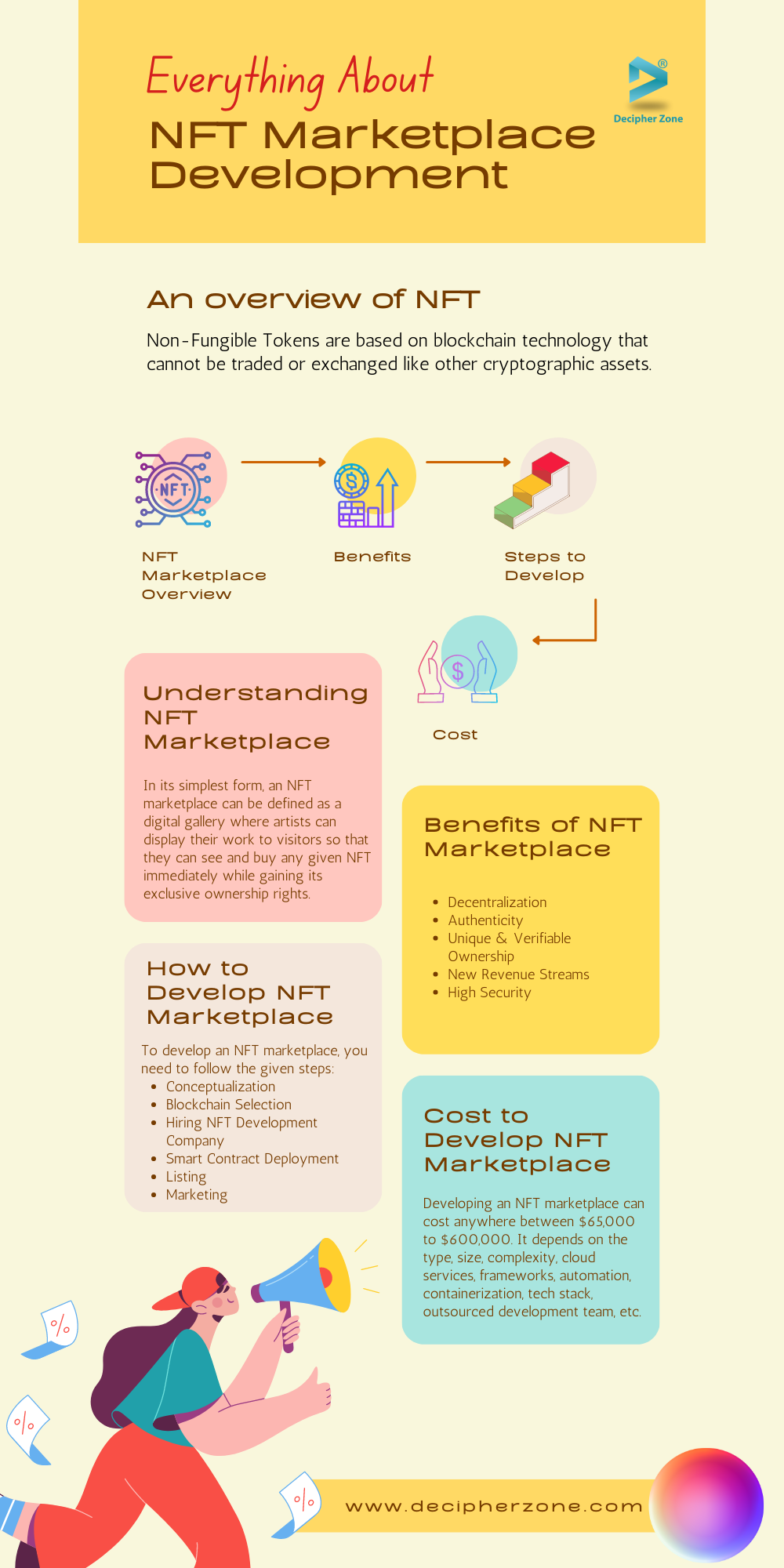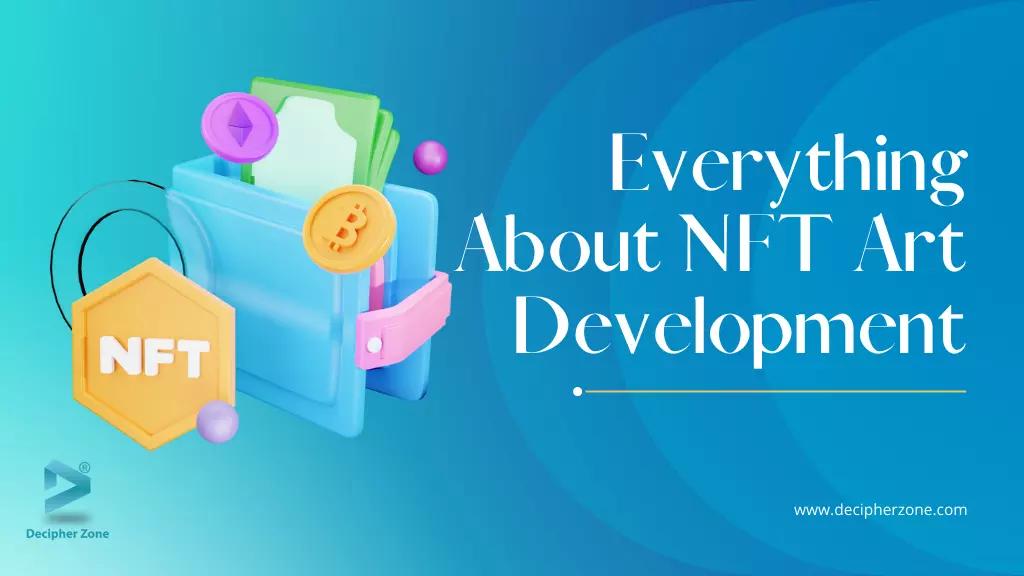Non-Fungible Tokens or NFTs have become popular, particularly in art and collectibles. However, the potential of NFTs goes beyond digital art. What’s more? According to Statista, the NFT marketplace size is expected to grow at a CAGR of 18.55% and reach $3162 million by 2027.
But wait, what are NFTs? Why would it be beneficial to develop an NFT marketplace? What is the cost of developing an NFT marketplace?
This blog will cover everything about NFTs to make it easier for you to understand what NFTs are, how to hire NFT developers, and everything in between.
An Overview of NFT Marketplace Development
Non-fungible means that the asset is unique and cannot be replaced with something else. For example, Ether and Bitcoin are fungible (interchangeable) while a one-of-a-kind art is non-fungible.
Read: How to convert art to NFT
NFTs are tokenized using blockchain so that they have unique identification codes and metadata, making NFTs distinct from other tokens. Put simply, NFTs are unique cryptographic tokens that can’t be replicated, reducing the chances of fraudulent transactions.
Read: How To Create an NFT Marketplace
The first ever NFT, Quantum, was created by Kevin McCoy on the Namecoin blockchain in 2014. Quantum NFT is a pixelated octagon image that changes color while moving like an octopus. It wasn’t until June 2021 that it was sold for $1.47 million by Sotheby's. It has been one of the most expensive digital artworks of the time.
Understanding NFT Marketplace Development
As NFTs are unique tokens they cannot be exchanged for an equivalent value token, making it impossible to trade them using traditional cryptocurrency platforms. To trade NFTs, one needs a platform specifically developed for storing, selling, buying, and exchanging NFTs. And that’s where the NFT marketplace comes into view.
Read: Decentralized Marketplace Development
In its simplest form, an NFT marketplace can be defined as a digital gallery where artists can display their work to visitors so that they can see and buy any given NFT immediately while gaining its exclusive ownership rights.
NFT marketplaces are managed using smart contracts as it monitors transactions, approves fund transfers, and removes works violating the content guidelines of the platform.
Read: Role of Blockchain in Fintech
Smart contracts, crypto wallets, trade transactions, minting, search and listing, transparency, and rating systems are some of the crucial components that a development team should add to the NFT marketplace at the time of development.
Benefits of NFT Marketplace Development
Some of the main benefits of the NFT marketplace development are as follows:
-
Decentralization
-
Authenticity
-
Unique & Verifiable Ownership
-
New Revenue Streams
-
High Security
Decentralization
As NFTs are stored on the blockchain network, a shared, immutable, decentralized, transparent ledger to record transactions and track assets, it reduces the need for intermediaries for selling or buying digital assets. It also makes it easier for the creators and collectors to sell and buy the ownership of these digital assets.
Authenticity
Mostly, it can be difficult to prove the authenticity of any asset if you don’t have the required knowledge. However, that’s not the case with NFTs. Non-fungible tokens can easily prove their authenticity and uniqueness with their unique identification codes and metadata.
Unique & Verifiable Ownership
With unique and verifiable ownership, NFTs make it effortless for creators to monetize their digital creations and for collectors to own valuable and unique digital assets.
New Revenue Streams
Beyond traditional models like advertising, the NFT marketplace gives creators a new way to monetize their assets. It also helps creators gain royalties every time their digital assets are resold, ensuring a recurring revenue stream.
High Security
Blockchain, cryptographic hashes, consensus algorithms, and smart contracts in the NFT marketplace makes it highly secure for transparent and faster trading of digital assets between creators and collectors.
How to Develop NFT Marketplace
For developing an NFT marketplace, you need to involve multiple steps. Including:
Conceptualization
The first step towards developing an NFT marketplace is to decide the niche of asset you want to be tokenized. It can be anything from digital art to virtual real estate.
Blockchain Selection
Next, you need to choose a blockchain supporting NFTs. Some of the blockchains you can choose from are Ethereum, Polygon, Binance Smart Chain, Solana, Flow, Cardano, etc.
Hiring an NFT Development Company
Once you have conceptualized and selected the blockchain and niche for the NFT marketplace, it is time to hire an NFT development company. To do so, you need to check for the expertise, technical capabilities, support, reputation, and development cost a company has and choose the one you find most capable to help your business.
Then contact the company, discuss project details, process, deliverables, etc., and get started with the NFT marketplace development.
Smart Contract Deployment
The next step here is to create a smart contract and deploy it on the chosen blockchain. Deploying the smart contract will allow creators to mint their NFTs, i.e., creating a unique identifier for their NFTs.
Listing
After minting, your NFT marketplace should also allow the users to list their NFTs for sale and allow buyers to purchase them using crypto wallets.
Marketing
Last but not least, to make your NFT marketplace profitable, you need to market it to potential users through digital marketing.
Read: Latest Trends in Blockchain Technology

Importance of Smart Contracts in NFT Marketplace Development
The scarcity and non-fungibility of the NFT marketplace are made possible by smart contracts. Smart contracts refer to the program encoded in the blockchain that automatically executes a set of actions once the pre-agreed terms and conditions are met.
Read: Global Business Management Software Development
The role of smart contracts in the NFT marketplace is to eliminate any intermediaries when it comes to trading digital assets. Put simply, a smart contract lives inside the code of the blockchain and helps in the management of non-fungible tokens.
Read: Payment Gateway Development
Some of the common benefits that using smart contracts in the NFT marketplace provide are immutability, process automation, peer-to-peer transactions, versatility, and lower execution costs.
NFT Marketplace Development Cost
Developing an NFT marketplace can cost anywhere between $65,000 to $600,000. It depends on the type, size, complexity, cloud services, frameworks, automation, containerization, tech stack, outsourced development team, and so much more.
Read: Project Management Software Development Cost
If you are also interested in developing an NFT marketplace where your business can help digital creators in listing and trading their unique assets, then get in touch with our experts, share your requirements, hire experienced developers, and get it developed within your budget.
FAQs: NFT Marketplace Development
What is the NFT Marketplace Development?
In its simplest form, an NFT marketplace can be defined as a digital gallery where artists can display their work to visitors so that they can see and buy any given NFT immediately while gaining exclusive ownership rights.
What are the stages of NFT marketplace Development?
Conceptualization, Blockchain Selection, Hiring an NFT Development Company, Deployment, Minting and Listing, and Marketing are the main stages of NFT marketplace development.
How much does NFT Marketplace development cost?
Developing an NFT marketplace can cost anywhere between $65,000 to $600,000 depending on the type, size, complexity, etc.

